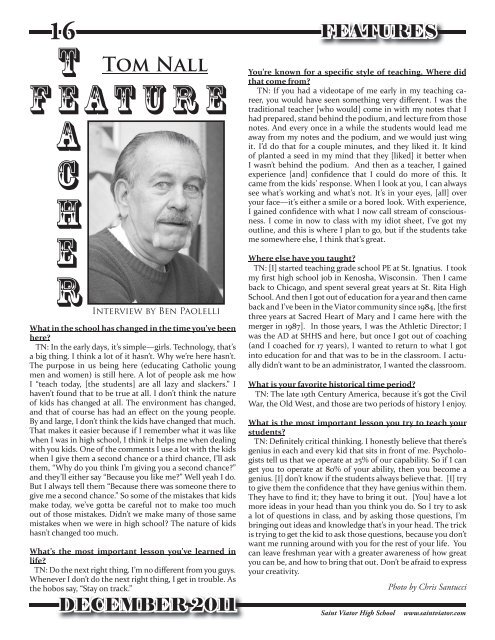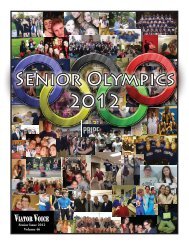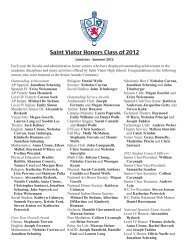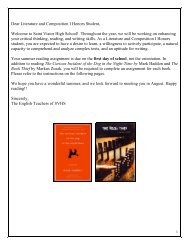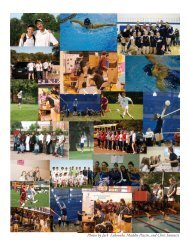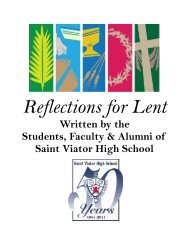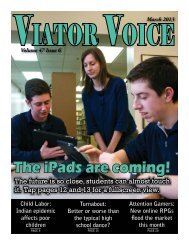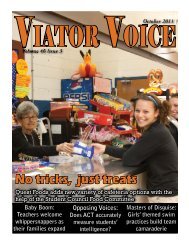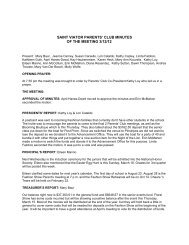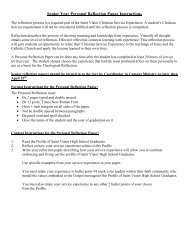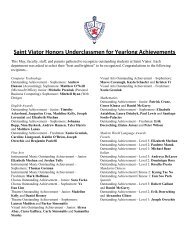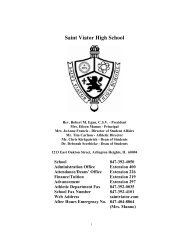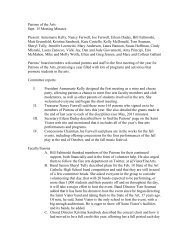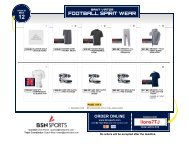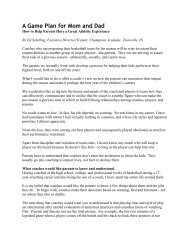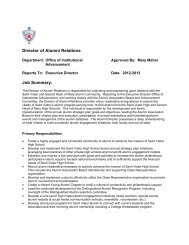views - Saint Viator High School
views - Saint Viator High School
views - Saint Viator High School
You also want an ePaper? Increase the reach of your titles
YUMPU automatically turns print PDFs into web optimized ePapers that Google loves.
16<br />
T Tom Nall<br />
F E A T U R E<br />
A<br />
C<br />
H<br />
E<br />
R<br />
Interview by Ben Paolelli<br />
What in the school has changed in the time you’ve been<br />
here?<br />
TN: In the early days, it’s simple—girls. Technology, that’s<br />
a big thing. I think a lot of it hasn’t. Why we’re here hasn’t.<br />
The purpose in us being here (educating Catholic young<br />
men and women) is still here. A lot of people ask me how<br />
I “teach today, [the students] are all lazy and slackers.” I<br />
haven’t found that to be true at all. I don’t think the nature<br />
of kids has changed at all. The environment has changed,<br />
and that of course has had an effect on the young people.<br />
By and large, I don’t think the kids have changed that much.<br />
That makes it easier because if I remember what it was like<br />
when I was in high school, I think it helps me when dealing<br />
with you kids. One of the comments I use a lot with the kids<br />
when I give them a second chance or a third chance, I’ll ask<br />
them, “Why do you think I’m giving you a second chance?”<br />
and they’ll either say “Because you like me?” Well yeah I do.<br />
But I always tell them “Because there was someone there to<br />
give me a second chance.” So some of the mistakes that kids<br />
make today, we’ve gotta be careful not to make too much<br />
out of those mistakes. Didn’t we make many of those same<br />
mistakes when we were in high school? The nature of kids<br />
hasn’t changed too much.<br />
What’s the most important lesson you’ve learned in<br />
life?<br />
TN: Do the next right thing. I’m no different from you guys.<br />
Whenever I don’t do the next right thing, I get in trouble. As<br />
the hobos say, “Stay on track.”<br />
DECEMBER 2011<br />
FEATURES<br />
You’re known for a specific style of teaching. Where did<br />
that come from?<br />
TN: If you had a videotape of me early in my teaching career,<br />
you would have seen something very different. I was the<br />
traditional teacher [who would] come in with my notes that I<br />
had prepared, stand behind the podium, and lecture from those<br />
notes. And every once in a while the students would lead me<br />
away from my notes and the podium, and we would just wing<br />
it. I’d do that for a couple minutes, and they liked it. It kind<br />
of planted a seed in my mind that they [liked] it better when<br />
I wasn’t behind the podium. And then as a teacher, I gained<br />
experience [and] confidence that I could do more of this. It<br />
came from the kids’ response. When I look at you, I can always<br />
see what’s working and what’s not. It’s in your eyes, [all] over<br />
your face—it’s either a smile or a bored look. With experience,<br />
I gained confidence with what I now call stream of consciousness.<br />
I come in now to class with my idiot sheet, I’ve got my<br />
outline, and this is where I plan to go, but if the students take<br />
me somewhere else, I think that’s great.<br />
Where else have you taught?<br />
TN: [I] started teaching grade school PE at St. Ignatius. I took<br />
my first high school job in Kenosha, Wisconsin. Then I came<br />
back to Chicago, and spent several great years at St. Rita <strong>High</strong><br />
<strong>School</strong>. And then I got out of education for a year and then came<br />
back and I’ve been in the <strong>Viator</strong> community since 1984, [the first<br />
three years at Sacred Heart of Mary and I came here with the<br />
merger in 1987]. In those years, I was the Athletic Director; I<br />
was the AD at SHHS and here, but once I got out of coaching<br />
(and I coached for 17 years), I wanted to return to what I got<br />
into education for and that was to be in the classroom. I actually<br />
didn’t want to be an administrator, I wanted the classroom.<br />
What is your favorite historical time period?<br />
TN: The late 19th Century America, because it’s got the Civil<br />
War, the Old West, and those are two periods of history I enjoy.<br />
What is the most important lesson you try to teach your<br />
students?<br />
TN: Definitely critical thinking. I honestly believe that there’s<br />
genius in each and every kid that sits in front of me. Psychologists<br />
tell us that we operate at 25% of our capability. So if I can<br />
get you to operate at 80% of your ability, then you become a<br />
genius. [I] don’t know if the students always believe that. [I] try<br />
to give them the confidence that they have genius within them.<br />
They have to find it; they have to bring it out. [You] have a lot<br />
more ideas in your head than you think you do. So I try to ask<br />
a lot of questions in class, and by asking those questions, I’m<br />
bringing out ideas and knowledge that’s in your head. The trick<br />
is trying to get the kid to ask those questions, because you don’t<br />
want me running around with you for the rest of your life. You<br />
can leave freshman year with a greater awareness of how great<br />
you can be, and how to bring that out. Don’t be afraid to express<br />
your creativity.<br />
<strong>Saint</strong> <strong>Viator</strong> <strong>High</strong> <strong>School</strong><br />
Photo by Chris Santucci<br />
www.saintviator.com


